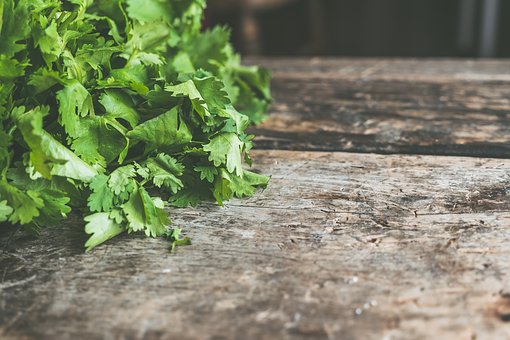Radical Scavenging Activity of Black Cumin (Nigella Sativa L.), Coriander (Coriandrum Sativum L.), and Niger (Guizotia Abyssinica Cass.) Crude Seed Oils and Oil Fractions
© Authored by PubMed
© HealthyMuslim. See Terms and Conditions
Copy Link
Email
Print

Coriander (Coriandrum sativum), also known as cilantro, Chinese parsley or dhania, is an annual herb in the family Apiaceae. Coriander is native to regions spanning from southern Europe and North Africa to southwestern Asia.
Ramadan MF, Kroh LW, Mörsel JT. Radical scavenging activity of black cumin (Nigella sativa L.), coriander (Coriandrum sativum L.), and niger (Guizotia abyssinica Cass.) crude seed oils and oil fractions. 1. J Agric Food Chem. 2003 Nov 19;51(24):6961-9.
Ramadan MF, Kroh LW, Mörsel JT. Radical scavenging activity of black cumin (Nigella sativa L.), coriander (Coriandrum sativum L.), and niger (Guizotia abyssinica Cass.) crude seed oils and oil fractions. 1. J Agric Food Chem. 2003 Nov 19;51(24):6961-9.
Crude vegetable oils are usually oxidatively more stable than the corresponding refined oils. Tocopherols, phospholipids (PL), phytosterols, and phenols are the most important natural antioxidants in crude oils. Processing of vegetable oils, moreover, could induce the formation of antioxidants. Black cumin (Nigella sativa L.), coriander (Coriandrum sativum L.), and niger (Guizotia abyssinica Cass.) crude seed oils were extracted with n-hexane and the oils were further fractionated into neutral lipids (NL), glycolipids (GL), and PL. Crude oils and their fractions were investigated for their radical scavenging activity (RSA) toward the stable galvinoxyl radical by electron spin resonance (ESR) spectrometry and toward 1,1-diphenyl-2-picrylhydrazyl (DPPH) radical by spectrophotometric method. Coriander seed oil and its fractions exhibited the strongest RSA compared to black cumin and niger seed oils. The data correlated well with the total content of polyunsaturated fatty acids, unsaponifiables, and PL, as well as the initial peroxide values of crude oils. In overall ranking, RSA of oil fractions showed similar patterns wherein the PL exhibited greater activity to scavenge both free radicals followed by GL and NL, respectively. The positive relationship observed between the RSA of crude oils and their color intensity suggests the Maillard reaction products may have contributed to the RSA of seed oils and their polar fractions. The results demonstrate the importance of minor components in crude seed oils on their oxidative stability, which will reflect on their food value and shelf life. As part of the effort to assess the potential of these seed oils, the information is also of importance in processing and utilizing the crude oils and their byproducts.
Link to this article: Show: HTML Link • Full Link • Short Link
Share or Bookmark this page: You will need to have an account with the selected service in order to post links or bookmark this page.





|
Related Articles:
- Anti-Inflammatory and Cytoprotective Effects of Selected Pakistani Medicinal Plants in Helicobacter Pylori-Infected Gastric Epithelial Cells
- Evaluation of Disease Modifying Activity of Coriandrum Sativum in Experimental Models
- Cardio Protective Effect of Coriandrum Sativum L. on Isoproterenol Induced Myocardial Necrosis in Rats
- Antifungal Activity, Toxicity and Chemical Composition of the Essential Oil of Coriandrum Sativum L. Fruits
- Assessment of Vitamin and Carotenoid Concentrations of Emerging Food Products: Edible Microgreens
- Flush Out Toxic Heavy Metals With Coriander
- Easy Carrot and Coriander Soup
- Coriander: A Beneficial Herb and Spice
You must be registered and logged in to comment.
Most Popular
Latest Articles
Popular Subjects
Health, fitness and longevity
Based upon the principles of health
in the Qur'an and Prophetic Traditions.
HealthyMuslim.Com
There are two bounties in which
most people lose out: good health
and free time. Al-Bukhari.
The information on this site is provided for educational purposes only. It is not intended as a substitute for professional advice of any kind.























